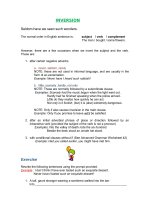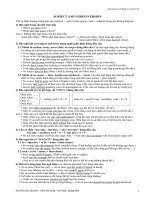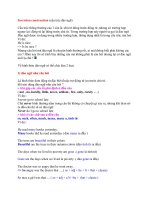inversion
Bạn đang xem bản rút gọn của tài liệu. Xem và tải ngay bản đầy đủ của tài liệu tại đây (78.2 KB, 2 trang )
INVERSION
Seldom have we seen such wonders.
The normal order in English sentence is: subject / verb / complement
The man / bought / some flowers.
However, there are a few occasions when we invert the subject and the verb.
These are:
1. after certain negative adverbs
a. never, seldom, rarely
NOTE: these are not used in informal language, and are usually in the
form of an exclamation.
Example: Never have I heard such rubbish!
b. little, scarcely ,hardly, not only
NOTE: These are normally followed by a subordinate clause.
Examples: Scarcely had the music begun when the light went out.
Hardly had he finished speaking when the police arrived.
Little do they realize how quickly he can act.
Not only is it foolish, (but) it is (also) extremely dangerous.
NOTE: Only if also causes inversion in the main clause.
Example: Only if you promise to leave will I be satisfied.
2. after an initial adverbial phrase of place or direction followed by an
intransitive verb (provided the subject of the verb is not a pronoun)
Examples: Into the valley of death rode the six hundred.
Beside the desk stood an ornate hat stand.
3. with conditional clauses without if (See Advanced Grammar Worksheet 42)
Example: Had you called earlier, you might have met him.
Exercise
Rewrite the following sentences using the prompt provided.
Example : I don’t think I have ever tasted such an exquisite dessert.
Never have I tasted such an exquisite dessert!
1. A tall, gaunt stranger wearing a sombrero walked into the bar.
Into ________________________________________________________
2. There was a huge explosion just after we left the building.
Scarcely ____________________________________________________
3. If we accepted the proposal, the others might feel slighted.
Were _______________________________________________________
4. People will only become aware of the problem if you increase the publicity.
Only if ______________________________________________________
5. It’s not very often that a minor novelist makes such an impact.
Seldom _____________________________________________________
6. The opposition doesn’t really know what we have been planning.
Little _______________________________________________________
7. A patch of water lilies grew along the edge of the stream.
Along ______________________________________________________
8. The resort is both cheap and unspoilt by tourism.
Not only ____________________________________________________









